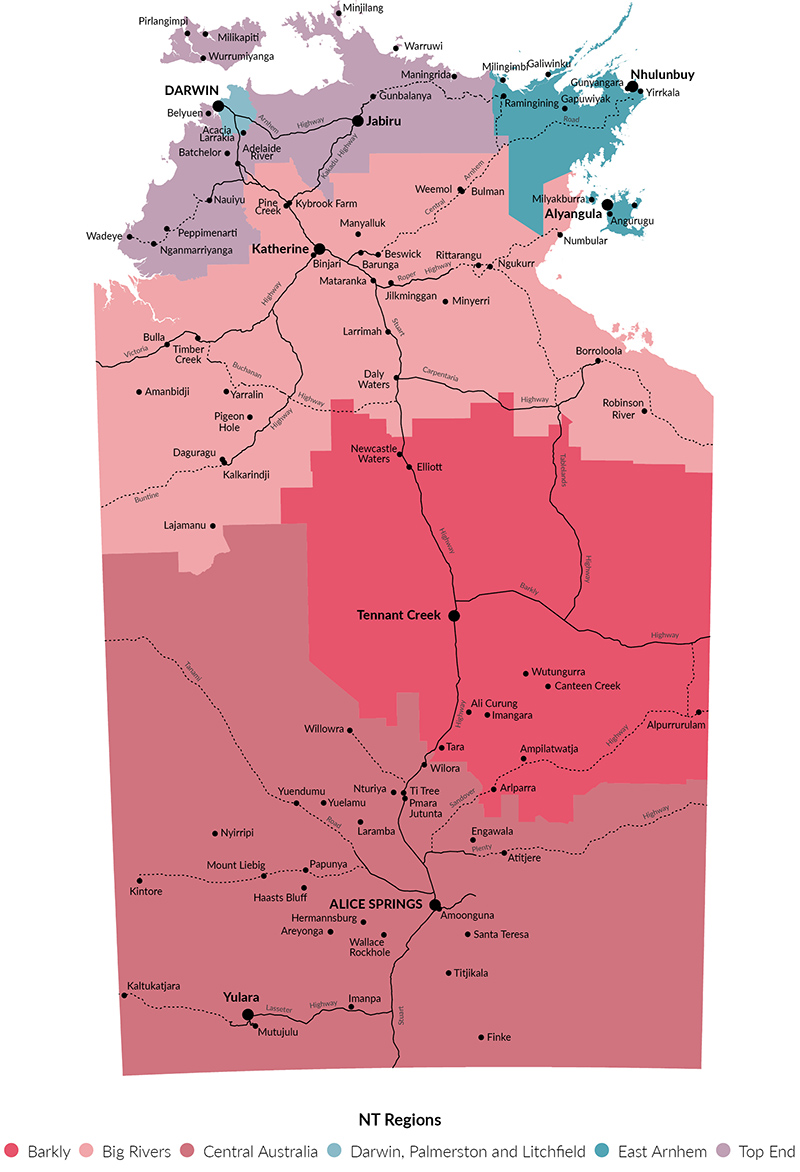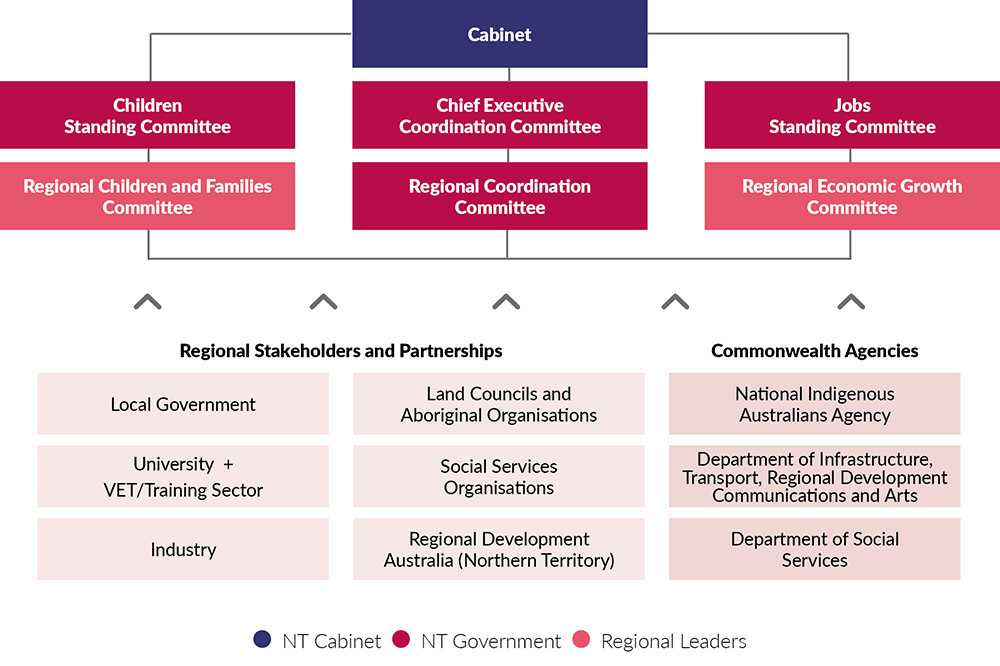Strengthening the regions
The NT Government is developing the NT Remote Stores Program
The Department of the Chief Minister and Cabinet is committed to a growing economy in places where Territorians want to live. Growing the Northern Territory’s (NT) population is critical to growing our economy.
A larger, more diverse population will mean better services, a stronger retail sector, more opportunity, more jobs, more significant private investment, and more revenue for the Territory.
Territory regional growth
The NT Government is committed to a pathway for the Territory to achieve a $40 billion economy by 2030. Our regions are the engine room of our growth. We are implementing local priorities and delivering increased investment, prioritisation and decision making in each region.
Our regions
The NT is administered through 6 defined regional areas:
Regional Development Framework
The Regional Development Framework guides the way regional development will be communicated, coordinated and delivered.
It recognises regional communities have their own strengths, aspirations and ideas. It provides the model for regional governance and collaboration between governments, industry, business, land councils, regional development bodies and the non-government sector.
The Framework guides how regions will:
- support effective regional economic planning, implementation and project facilitation including coordinating effort from all spheres of government and stakeholders – with support to facilitate feasibility and business case development for investment attraction
- establish effective governance and engagement arrangements across agencies, stakeholders, business leaders, traditional owners and communities that provide a clear regional voice to government
- identify barriers and enablers to regional economic growth, including areas for structural reform and priority government investment
- develop Regional Economic Growth Plans to inform priorities for government investment, attract private sector investment, increase Aboriginal economic development and support local industry growth and diversification
- access regionally derived data, information and analysis to improve and inform decision making, regional investment and measurable outcomes.
Find out more
Read more about:
The Northern Territory Government is developing the NT Remote Stores Program.
The Program achieved the required legislative support with the gazettal of the Northern Territory Food Amendment Bill 2023 in October 2023.
There are more than 100 community stores across the NT. The NT Food Security Program is designed to improve the availability and variety of healthy food and drinks in remote areas; and to make sure the NT Government gives the right support to community stores.
Next steps
Community stores included in the Program will be declared by the Chief Health Officer. These stores will be contacted when this happens.
A set of food security standards will be declared by the NT Minister for Health; and a set of best practice guidelines will be formally declared by the NT Chief Health Officer. These are still under development and consultation will be occurring over the coming months.
Authorised officers will start to visit community stores and assess food security in 2024. Community stores will be contacted by the NT Remote Stores team before this happens.
The NT Government recognises how important community stores are and will continue to provide support and information as the Program develops.
Do stores need to do anything
No, community stores don’t need to do anything yet.
The NT Food Remote Stores team will be in touch, and this site will be updated as the Program develops.
More Information
You can contact a member of the NT Remote Stores Program team on email CMC.RegionalDevelopment@nt.gov.au or call on 08 8999 8892.
More information is also available in the NT Food Act 2004.
All NT Food Businesses must be registered pursuant to the Northern Territory Food Act 2004. For more information, go to the NT.GOV.AU website.
Regional Economic Growth Committees will lead the development of Regional Economic Growth Plans. The Growth Plans will:
- identify regional priorities for economic growth and the implementation pathways and actions required to deliver them
- support government decision making and private sector investment decisions
- define the region’s connection and contribution to the Territory’s overall growth strategy and the regional implementation of identified priorities
- set goals and actions that allow a region to prioritise what is most important and how they can be implemented to locally agreed timelines and delivery methods.
Regional Economic Summaries and Growth Planning can be found for each region below:
The Barkly Regional Deal is a joint partnership between the three levels of government to support the region’s economic and social development. Under the Local Decision Making plan the Northern Territory Government partners with Aboriginal communities to assist the transition of government services and programs to community control.
Visit the Local Decision Making website
Alice Springs is the heart of Australia's Red Centre. Our goal, is to establish the region as Australia’s inland capital. The revitalisation of the Alice Springs CBD is one of the Northern Territory Government priorities to improve the liveability and attractiveness of Alice Springs for residents and visitors.
Visit the Revitalising Alice website
Local Decision Making (LDM) is facilitating a new working relationship between Aboriginal communities and government agencies to support self-determination.
Visit the Local Decision Making website.
The Darwin City Deal is a ten year agreement between the Australian and Northern Territory Governments and the City of Darwin.
Visit the Activate Darwin website
The Office of Aboriginal Affairs (OAA) is responsible for providing support, engagement and advice to Aboriginal people and government on significant Aboriginal Affairs priorities through strategic Aboriginal policy matters, key projects and meaningful engagement and partnerships.
Visit the Office of Aboriginal Affairs website
Learn more about councils, local government, legislation, committees, elected member resources.
Give feedback about this page.
Share this page:
URL copied!

